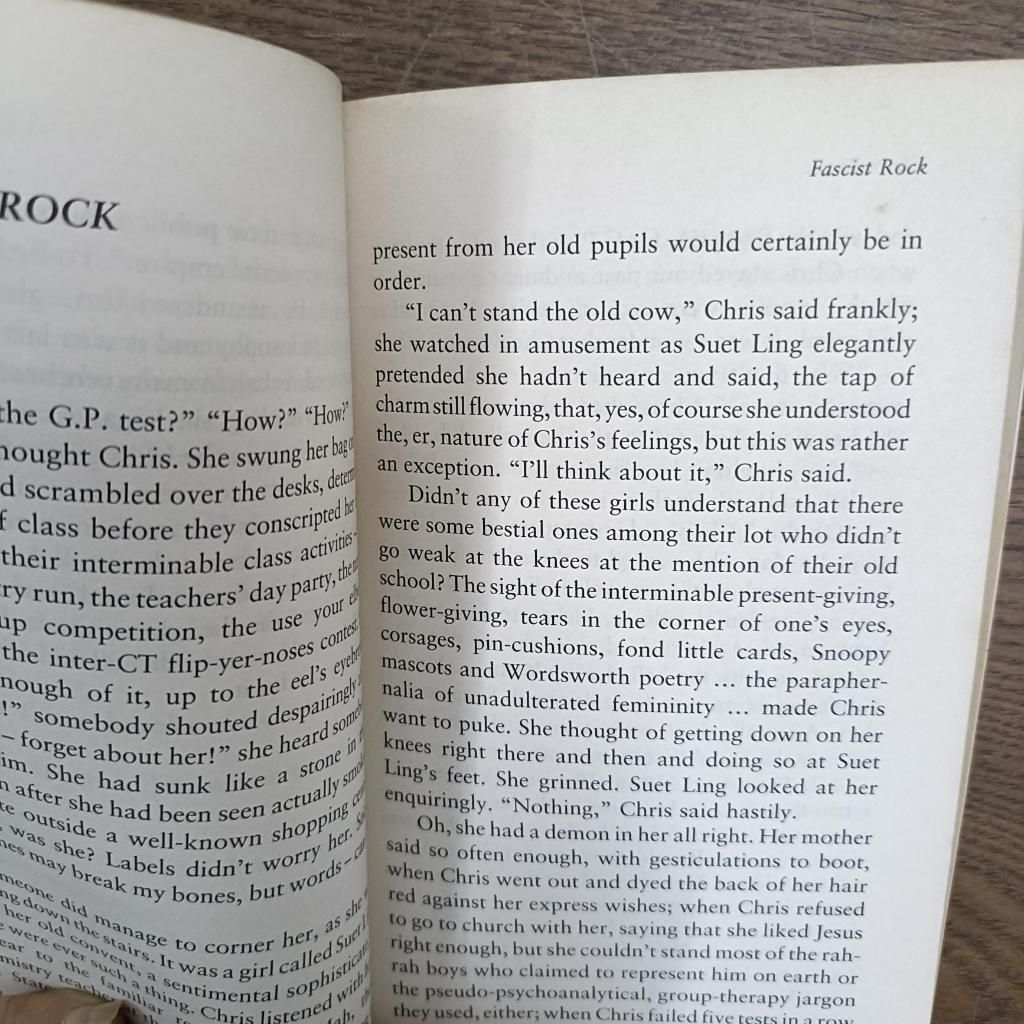Fascist Rock: Stories of Rebellion Claire Tham
- Regular price
- RM 2.12
- Sale price
- RM 2.12
- Regular price
-
RM 0.00
Worldwide shipping
Secure payments
Authentic products
Share
Tham’s first published collection of short stories. Brilliant, opinionated, and irreverent, Tham demonstrated a capacity to capture the mood and manners of twenty-year-old Singaporeans with given names like Patsy, Chris, Alphonsus, James, Jeanne, and Irwin, who typically inhabit cars, arcades, and condominiums, and who convey sentiments about as deep as a half-smoked cigarette, a pop song, or an evening drive past ghostly grey blocks of flats. The title
Fascist Rock
is about the only ambiguity in this book. It could refer to a place, to music, or to an attitude, or all three. For the characters in the story, “Baby, You Can Drive My Car’, life is brittle, hedonist, narcissistic, escapist, ‘a fake magazine existence.” The past is dead, and a friend’s death brings merely a futile shrug of the shoulder. Tham’s terse, spare prose surges up out of each story as her characters express their frustration at life on an island “no longer than a peanut”, at official recollections of thousands of years of Chinese history which do not translate to Singapore, and at conformist practices like university initiations. Even a classic Chinese immigrant success story can go sour when in the story, “Homecoming”, a Singaporean university student returns from London to confront the solitary loneliness of a recently-deceased father, who “did nothing but stay in his flat all day, re-reading the papers and waiting for the moment his son would come home. Behind every educational achievement, Tham indicates, there is an enormous private cost. The contrast of generational opportunity in this story is profound.
Older Singaporeans are allowed some, albeit brief, say in Tham’s literary vision. In the story just called “Lee”, it is left to a Chinese Singaporean father to explain to his Americanised, street-smart daughter that any former colony full of comparatively recent immigrants has to try doubly hard to matter and to be respected in a competitive world. However, at least by comparison, a measure of acquiescence is possible, even for restless youth caught in a “milieu of work and pragmatism.” The story called “Pawns” is set in June, 1989. The events of that time in China sent shockwaves throughout the rest of Asia, and indeed the world. “Pawns” vividly shows that the Lion City is more than preferable to a Celestial Middle Kingdom that can silence the cream of its educated younger generation at Tiananmen Square.'
Fascist Rock
is about the only ambiguity in this book. It could refer to a place, to music, or to an attitude, or all three. For the characters in the story, “Baby, You Can Drive My Car’, life is brittle, hedonist, narcissistic, escapist, ‘a fake magazine existence.” The past is dead, and a friend’s death brings merely a futile shrug of the shoulder. Tham’s terse, spare prose surges up out of each story as her characters express their frustration at life on an island “no longer than a peanut”, at official recollections of thousands of years of Chinese history which do not translate to Singapore, and at conformist practices like university initiations. Even a classic Chinese immigrant success story can go sour when in the story, “Homecoming”, a Singaporean university student returns from London to confront the solitary loneliness of a recently-deceased father, who “did nothing but stay in his flat all day, re-reading the papers and waiting for the moment his son would come home. Behind every educational achievement, Tham indicates, there is an enormous private cost. The contrast of generational opportunity in this story is profound.
Older Singaporeans are allowed some, albeit brief, say in Tham’s literary vision. In the story just called “Lee”, it is left to a Chinese Singaporean father to explain to his Americanised, street-smart daughter that any former colony full of comparatively recent immigrants has to try doubly hard to matter and to be respected in a competitive world. However, at least by comparison, a measure of acquiescence is possible, even for restless youth caught in a “milieu of work and pragmatism.” The story called “Pawns” is set in June, 1989. The events of that time in China sent shockwaves throughout the rest of Asia, and indeed the world. “Pawns” vividly shows that the Lion City is more than preferable to a Celestial Middle Kingdom that can silence the cream of its educated younger generation at Tiananmen Square.'
×
×
Reviews
Be the first to review
Write an review
How would you rate the product?
More thought about the product







